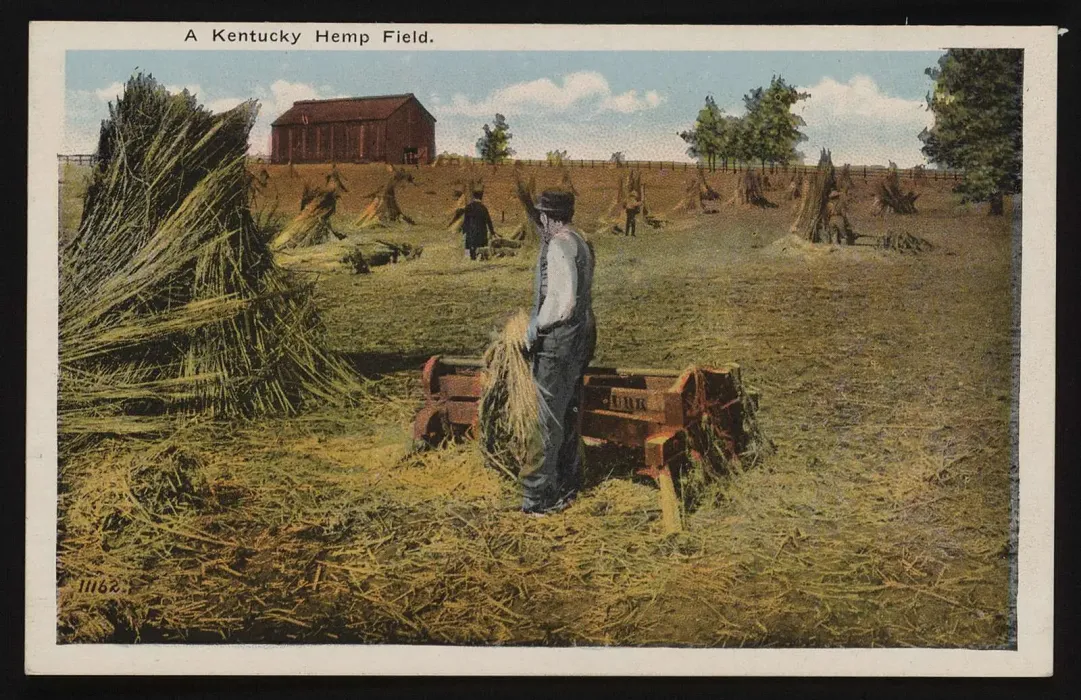
Above image: A Kentucky Hemp Field. Kraemer Art Co. (Cincinnati, Ohio) Postcard. Retrieved from the Kentucky Historical Society, Ronald Morgan Kentucky Postcard Collection, Graphic 5.
Introducing Our Blog, Meitheal.
Meitheal, the name of the Charles Burns Family Association blog, is the Irish word for a work team, gang, or party and denotes the cooperative labour system in rural Ireland where groups of neighbors help each other in turn with farming work. Neighbors who give their work to others are helped in turn with their own seasonal tasks, so the heart of the concept is coummunity unity through cooperative work and mutually reciprocal support. Meitheal is the Irsish expression of the ancient and universal appliance of cooperation to social need.
So why are we using an Irish term as a name for our blog? Because Y DNA testing overwhelmingly indicates that our male Burns ancestors are of Irish descent. This is true for both Y DNA mutations that occurred before recorded history and through to present day Y DNA matches.
How does one pronounce Meitheal? Because our Burns line is from northern Ireland, it probably would have been pronounced by our ancestors with an Ulster dialect.
The concept encapsulates both our Celtic heritage and the hopes an dreams of those who are working to make the Charles Burns Family Association a reality. We believe we can create greater value by working together than any one of us could achieve individually. Meitheal!
In closing let me share a bit from a wonderful article written by Dr. Suzanne Degges-White (Psychology Today, January 20, 2021).
"While my own heritage is a bit more Scottish than Irish, I feel a deep connection to all things Celtic, from ancient legends to contemporary Celtic music. So, last weekend, I caught a new move on TV that was set in Ireland named, "Herself." While I don't want to give away too much information about the plotline, during the film a ragtag group of folks came together as a community of support to help the central character get her life back together.
I may have to mumble along to the Celtic lyrics Enya sings, but a word used in the movie, meitheal, caught my ear and stuck in my mind, as a character described what it meant. The term, meitheal, was used to describe the work they were doing in support of one individual to whom they owed nothing. As the grassroots initiative was described, when we all come together as a community to help one person, not only does it help the recipient, but it also benefits every single person who provides aid. A meitheal is about a community banding together to help a fellow member of the community accomplish a goal.
Traditionally, meitheal described an agricultural kind of task like harvesting fields of hay or getting crops in the ground. But it's rooted in community altruism and that's the type of practice that keeps a coummunity thriving. The beauty of the effort to deliver meitheal is that everyone who participates in providng labor will benefit from their investment in the wellbeing of another.
…
Meitheal describes the union of two import "feel good" factors. Doing someone a "solid" and feeling like part of a group both send surges of endorphins, seotonis, axytocin, the "natural high" inducing neurochemicals, to our brains. The one-two punch of bonding with others and accomplishing a goal leaves us feeling pretty stoked. The human body rewards us when we engage in behaviors that reflect good choices. No wonder the healing of self happens through the healing of others, right?Another benefit of doing someone a favor is that it lowers any pressure or anxiety someone might feel in asking for a favor for themselves later on. It's easier to ask for help from someone for whom you've given help in the past.
Civilization is proof that people must work together to move forward. When we all play a role in community initiatives, the pay-off includes a sense of belonging and the reward of knowing that our contribution had value."
